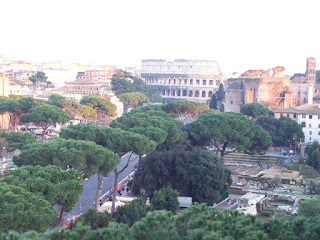I arrived in Rome on 17 Dec. and stayed there for a few days before continuing on to Sicily to spend Christmas with the Niemanns. The trip was relatively quiet; I was by myself in Rome, so while a did a lot of sightseeing, nothing particularly noteworthy happened (which is good, because noteworthy travel stories are usually bad!). I stayed in a great hostel a few blocks down from the Vatican, which meant that I was in walking distance to a lot really cool stuff. That was my favorite part, actually, just walking around. I do quite a lot of solitary walking at home, but here in England the weather has gotten too cold. It was nice to take up an old pastime again, especially in a place as beautiful and historic as Rome.
It's so easy to get lost (figuratively speaking) in everything that has happened there over countless centuries that it's almost overwhelming at times. I was particularly moved by the Palatine and the Forum for that reason. Even though it's in the center of the city, it's grassy and quiet, and so unlike the bustling hub of the known world that it once was. As cliche as it probably is, I found myself poking around the rubble ponder the fall of Rome, as well as human mortality. Comprehending individual death is one thing, but witnessing the hulking, broken monuments to gods and men we know longer remember brings home a greater kind of death, that of an entire world, really. As morbid as this may sound, my attitude was not so. After all, what is Rome today, what has she been for centuries, if not a new world, a new civilization? She was reborn from the rubble, if she ever died at all.
What is more, the city and the people live with their history shoulder to shoulder. The Colosseum was used a quarry but still stands, like a crown. Teetering apartment buildings lean up against even older teetering apartment buildings, lining streets that have been there for hundreds of years. Ancient pagan structures were converted into churches. The newest building were constructed by Mussolini in the thirties, and even these remain (and probably will for centuries). All of these things have been absorbed into the everyday, and while this may de-romaniticize the history somewhat, I feel like it's the way it should be. It's so very different from the way we treat history in the US. Anything remotely old is swept away and shut up behind glass or put on some registry and made off-limits. I think this reflects a very contradictory attitude toward history in the American consciousness; on one hand, it's something sacred and precious, while on the other, it becomes so because if it doesn't, it will be cleared away to make way for the new. There is no living with it and taking it into ourselves. I could go on, but I think I'll leave that here for now.
And now for some photos:
I got of at the wrong bus stop and this is what I found - Trajan's Forum.

The Spanish Steps.

Evening view of the Campo di Fiori.
Colosseum, as seen from the Victor Emmanuel Monument.
The paper chain!
2 comments:
The most beautiful thing in life is seeing beauty through the eyes of your child. May your quest for knowledge and adventure be your constant companion, and I hope you never lose your ability to experience awe. Thanks.
I'm assuming "S&P" is your parents and if so their comment is SO CUTE!!
But I'm glad you're had a nice time in Italy! It all looks really pretty. Is there a story with the paper chain?
The Spanish steps! They much be in Spain! I'll be there soon! Oh wait....
"Ozymandias"
Anyways, I hate to do this to you, but as intelligent as your musings on the deeper meanings of dilapidated statues to fallen kings were, Percy Bysse. Shelly already beat you there:
I met a traveller from an antique land
Who said: `Two vast and trunkless legs of stone
Stand in the desert. Near them, on the sand,
Half sunk, a shattered visage lies, whose frown,
And wrinkled lip, and sneer of cold command,
Tell that its sculptor well those passions read
Which yet survive, stamped on these lifeless things,
The hand that mocked them and the heart that fed.
And on the pedestal these words appear --
"My name is Ozymandias, king of kings:
Look on my works, ye Mighty, and despair!"
Nothing beside remains. Round the decay
Of that colossal wreck, boundless and bare
The lone and level sands stretch far away."
Post a Comment